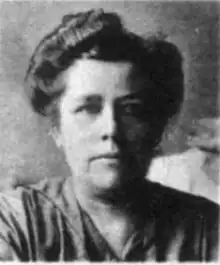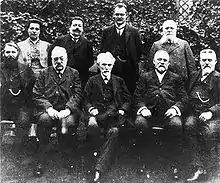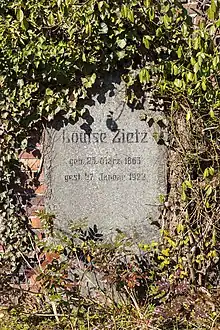Luise Catharina Amalie Zietz | |
|---|---|
 Luise Zietz (1919) | |
| Born | 25 March 1865 |
| Died | 27 January 1922 (aged 56) |
| Nationality | German |
| Occupation(s) | feminist, politician, member of the Weimar National Assembly, member of the Reichstag of the Weimar Republic |
| Years active | 1896–1922 |
| Known for | one of the first female members of the Reichstag |


Luise Catharina Amalie Zietz (née: Körner) (1865–1922) was a German socialist and feminist.[1] She was the first woman to occupy a leading party post in Germany.[2] She also helped bring the socialist women's movement into the Social Democratic Party of Germany.[1]
In 1908, the same year the government legalized women's participation in politics, she became the first woman appointed to the executive committee of the Social Democratic Party of Germany.[1][3] She later nominated Marie Juchacz for a paid position by the party as the Cologne women's secretary in what was then the Upper Rhine province.[3]
Zietz and Friedrich Ebert, Hugo Haase, Hermann Molkenbuhr and Hermann Müller attended the Vienna Socialist Conference of 1915 representing the Social Democratic Party of Germany.[4]
In 1917 she was one of the main agitators in favor of a split in the party, which led to the formation of the Independent Social Democratic Party of Germany.[1] She then became a leader in the creation of that party's women's movement.[1]
She was one of the first female members of the new Reichstag in 1919.[1]
References
- 1 2 3 4 5 6 Joseph A. Biesinger (1 January 2006). Germany: A Reference Guide from the Renaissance to the Present. Infobase Publishing. pp. 755–. ISBN 978-0-8160-7471-6.
- ↑ All Power to the Councils!: A Documentary History of the German Revolution of 1918–1919. PM Press. 1 June 2012. pp. 262–. ISBN 978-1-60486-737-4.
- 1 2 Jennifer Striewski (Bonn) (8 March 2013). "Marie Juchacz (1879-1956), Begründerin der Arbeiterwohlfahrt". Landschaftsverband Rheinland (LVR), Cologne. Retrieved 11 November 2014.
- ↑ Olga Hess Gankin and H.H. Fisher eds, The Bolsheviks and the First World War: the origins of the Third International Stanford University Press, 1940 p.284